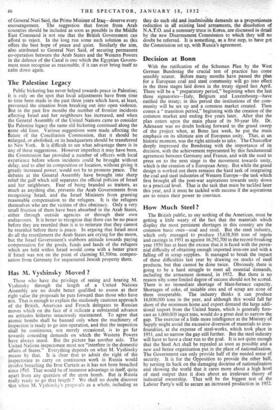Has M. Vyshinsky Moved ?
Those who have the privilege of seeing and hearing M. Vyshinsky through the length of a United Nations Assembly are no doubt better qualified to assess at their right value the proposals he puts forward than those who have not. That is enough to explain the studiously cautious approach of the British, American and French delegates to Russian moves which on the face of it indicate a substantial advance on attitudes hitherto tenaciously maintained. To agree that atomic bombs shall be banned only when the machinery of inspection is ready to go into operation, and that the inspection shall be continuous, not merely occasional, is to go far towards conceding demands on which the Western Powers have always stood. But the picture has another side. The United Nations inspectorate must not "interfere in the domestic affairs of States." Everything depends on what M. Vyshinsky means by that. It is clear that to admit the right of the inspectorate to carry on continuous work in Russia would involve breaching the Iron Curtain as it has not been breached since 1445. That would be of immense advantage in itself, quite apart from any question of the atom bomb. But is Russia really ready to go that length ? We shall no doubt discover that when M. Vyshinsky's proposals as a whole, including as they do such old and. inadmissible demands as a- propontio' nate reduction in all existing land armaments; the dissolution of N.A.T.O. and a summary truce in Korea, are discussed in detail by the new Disarmament Commission to which they will no doubt be referred. It is something, as a first step, to have got the Commission set up, with Russia's agreement.


































 Previous page
Previous page